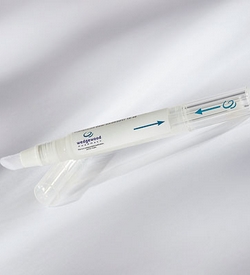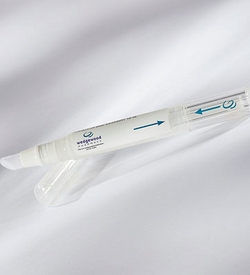Providing Quality & Trust || Clinic Website
Mirtazapine Transdermal Gel Twist a Dose
Wedgewood Pharmacy
Starting at $110.50
$110.50 Each
Detailed Description
Mirtazapine: Transdermal Gel Twist a Dose
Mirtazapine is a tetracyclic anti-depressant that is prescribed by veterinarians to treat a wide range of conditions, from behavioral problems to loss of appetite in cats. Mirtazapine is particularly useful for patients with anxiety and sleep disturbance. It has a rapid onset of action in comparison to many anti-depressant medications. It has a dual mechanism of action, being both a noradrenergic and specific serotonergic drug (NaSSA). Mirtazapine is metabolized primarily by the liver.
Mirtazapine may be prescribed for:
- Vomiting
- Anorexia
- Nausea
One of the dosage forms available for Mirtazapine is Twist-a-Dose Transdermal Gel. A Wedgewood Pharmacy exclusive. We dispense transdermal gels in our exclusive Twist-a-Dose® applicator. With just two steps, a no-mess applicator, and no tiny markings to read, you can rest assured that patients will receive the prescribed amount of medication while reducing exposure to the pet owner. Wedgewood Pharmacy understands the need for alternative routes of delivery when oral dosing is not a feasible option. Wedgewood Pharmacy recommends that you consult with a pharmacist before you prescribe a transdermal medication.
Prescribed For:
- Dogs
- Cats
Veterinary Uses for Mirtazapine:
Mirtazapine is used as an appetite stimulant for dogs and cats that are refusing to eat. It also is prescribed for long-term treatment of various patients who are experiencing nausea, vomiting, and anorexia.
There is very little scientific information available on this drug in cats, although it is mentioned in the proceedings of a number of feline veterinary meetings. Anecdotal reports of use include cats with chronic renal failure, pancreatitis, diabetes mellitus, and other depressed, older, sick-cat situations. Possible advantages for using mirtazapine over cyproheptadine are once every three days dosing and the anti-emetic properties. In human medicine, the notable downside to mirtazapine is weight gain. When treating sick, anorectic cats, this might be considered a positive attribute.
Other uses for mirtazapine include treating behavioral problems like separation anxiety, urine spraying, and insomnia.
Potential Side-Effects of Mirtazapine:
Mirtazapine generally is well tolerated in dogs and cats, although trials are lacking. Common side- effects include drowsiness, sedation, low blood pressure, and increased heart rate.
If the animal experiences breathing difficulties, hives or swelling of the lips, tongue, or face, then an allergic reaction to the drug can be the case.
The most-common side effects in humans are somnolence, dry mouth, increased appetite, and weight gain.
Drug Interactions with Mirtazapine:
Based on human literature, mirtazapine has fewer drug-interactions than many of the other drugs used to treat depression. There is no specific information available about treatment in cats.
Mirtazapine has a wide margin of safety in humans. No information was found in the literature regarding cats. If an overdose is recognized promptly, gut-emptying protocols can be tried.
Precautions for Using Mirtazapine:
Mirtazapine should not be prescribed or administered to a patient that is hypersensitive or allergic to the medication. It also should be used with caution whenever the animal is taking other medications, as it can interact with other drugs, including Tramadol and monoamine oxidase inhibitors.
Dosage and Administration of Mirtazapine:
Mirtazapine is available from compounding pharmacies in varying strengths of oral and topical formulations. The dosage, formulation, and frequency of administration are determined according to what the drug is being used to treat and the type and size of animal receiving the treatment.
Since this medication is an anti-depressant, abrupt cessation of the drug is not recommended. The animal should be weaned off mirtazapine over an acceptable period of time.
Instructional Video

Powered by nopCommerce
This site is running in live payment mode. Real payments will be processed.

